- True Wireless Earbuds Nav_All True Wireless Earbuds
- Over-Ear & On-Ear Headphones Nav_All Over-Ear & On-Ear Headphones
- Wireless Headphones Nav_All Wireless Headphones
- Wired Headphones Nav_All Wired Headphones
S351DB
Select_Colour: Black
Designed for Sound Born as Remarkable
With the classical and luxurious design, it is not just for catching your friends' eyes, but also for high quality sound reproduction. All-wooden cabinets of the subwoofer and satellite speakers complement any style of your room's decorate, moreover, minimizing acoustic resonance and reducing distortion.

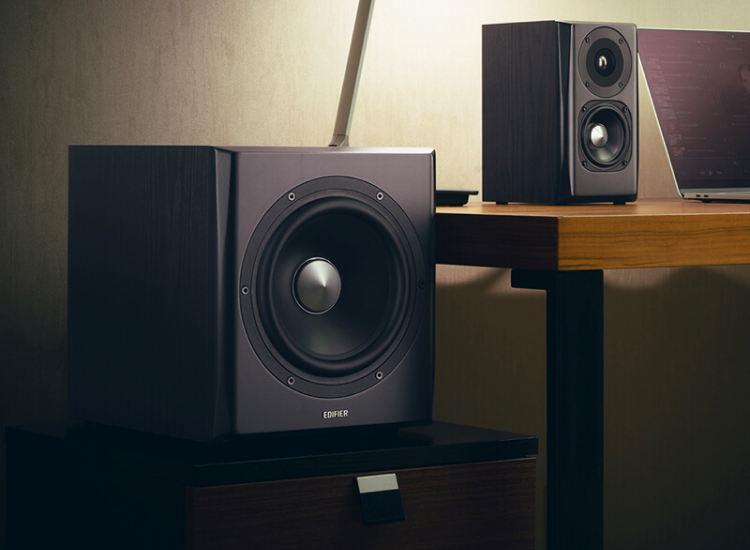
Powerful Bass
The 8" bass driver of subwoofer, with the cast aluminium frame and benefiting from the long-stroke design, can reproduce the bass with the frequency down to 40Hz. The powerful bass amplifier can generate the output power up to 70 watts (RMS). The flared bass reflex port is calibrated to make the bass more powerful. Start a concert album, your favorite game or a historical movie, to feel the warmth or rocking of deep bass.
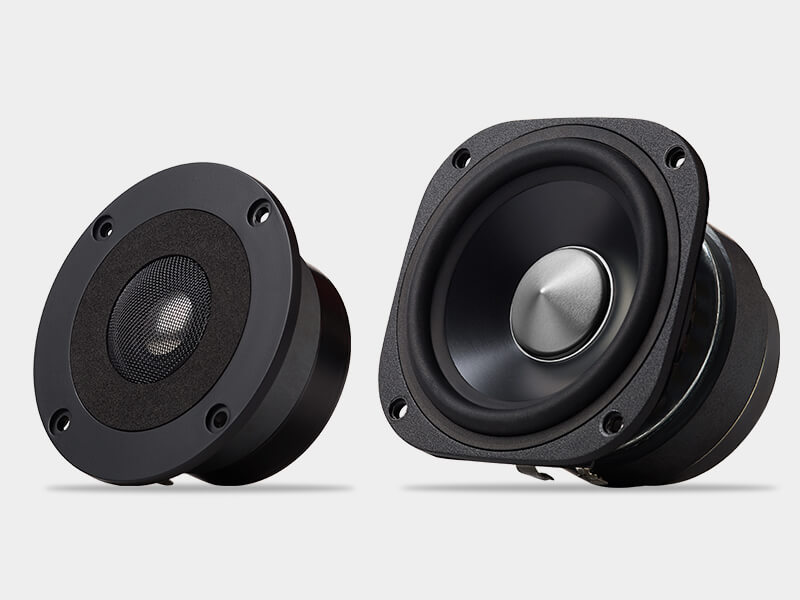
Full-bodied Mids and Crisp Highs
The 3.5" mid-bass drivers consist of aluminium alloy diaphragm and cast aluminium frame, from which the mids sound full-bodied and rich. The ¾" titanium dome tweeters are finely tuned for the precise reproduction of high pitches, from which the trebles sound crisp and bright.
Bluetooth Connectivity for
Seamless Audio Streaming
Bluetooth features strong resolution, stable transmission, low power consumption, and wide purpose of use, delivering high-quality audio experience.
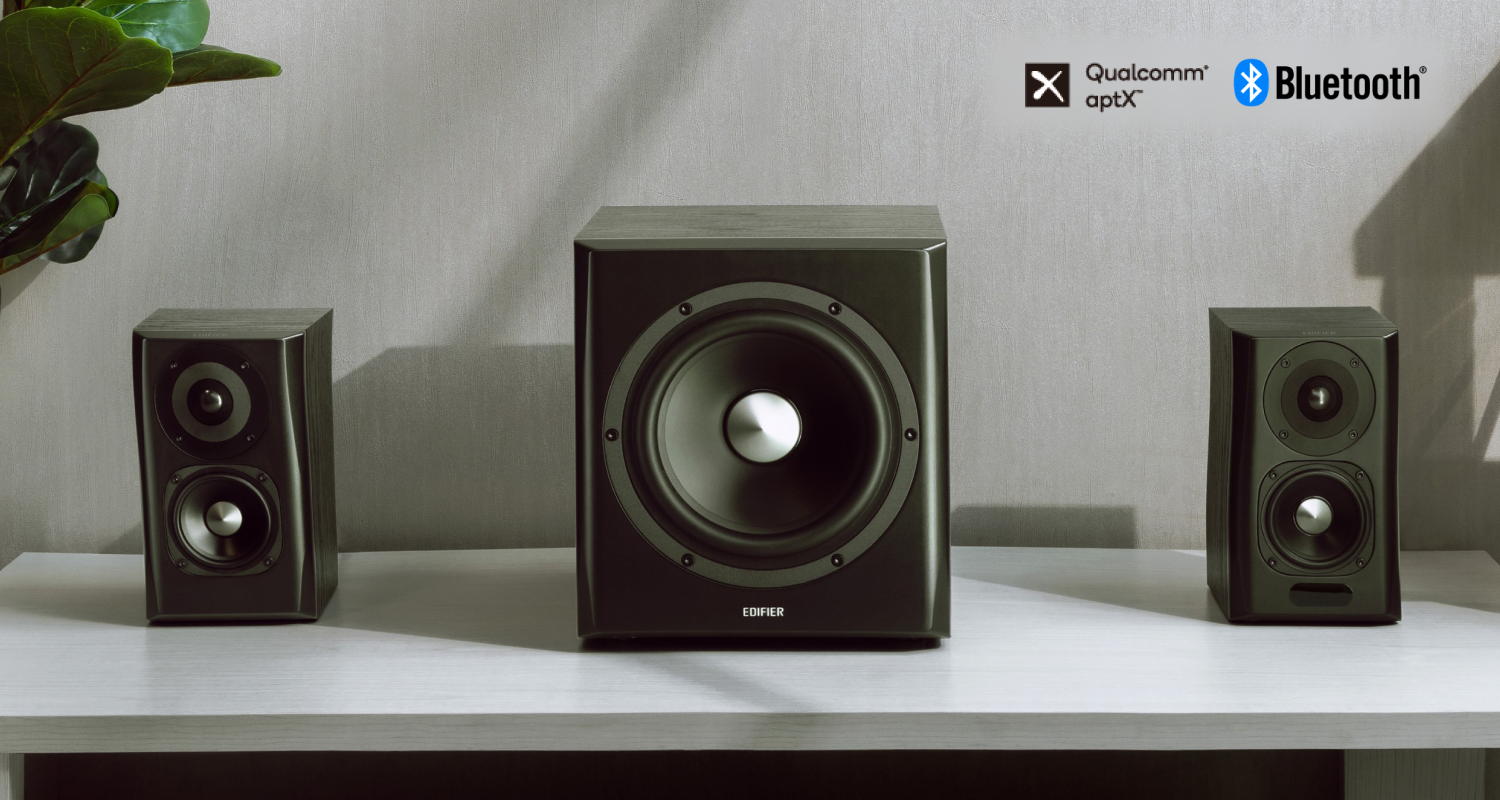

Class-D Digital Amplifier
The DSP chipset precisely divides the signals into highs, mids and lows. With three independent ways, the Class-D digital amplifier distributes enhanced audio signals of different frequency bands to target drivers for accurate reproduction.
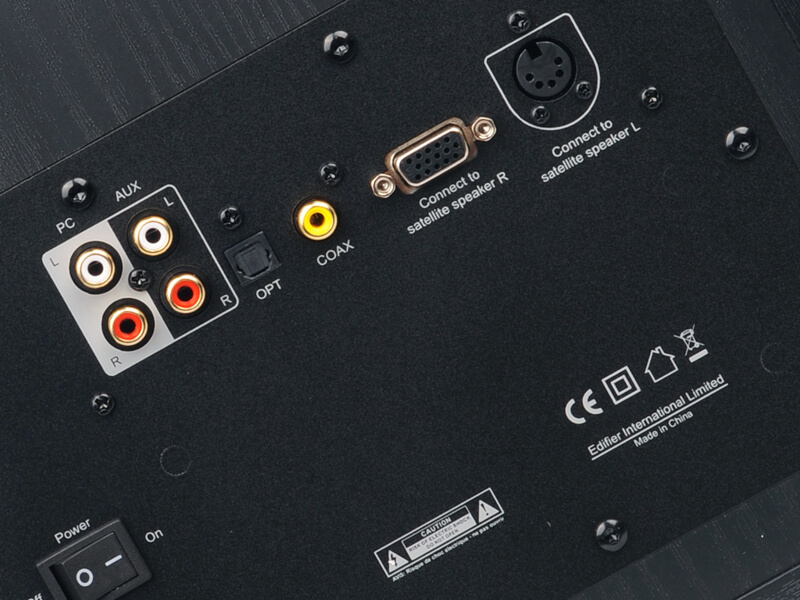
Rich Connectivity
Multiple interfaces are available for the connection to different audio sources. Enjoy the music from Line In, OPT, or COAX, just as you like. The OPT and COAX sockets support the input of high quality audio signals with a sampling rate of 44.1kHz/48kHz.
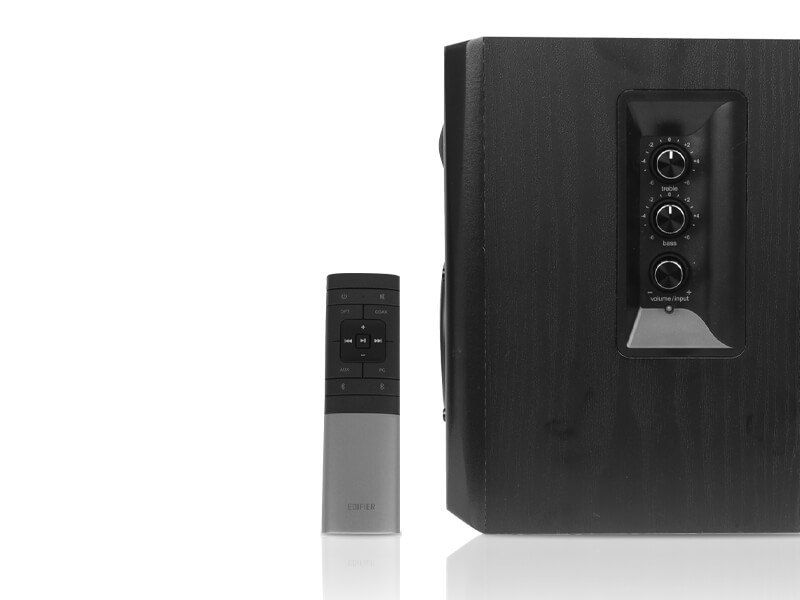
Simple Control
With side-mounted knobs and the remote control, easily operate the product and enjoy full functions.
Signal-to-Noise Rate:
R/L: ≥ 80dB (A)
SW: ≥ 85dB (A)
Total_Output_Power_RMS:
R/L(treble): 15W + 15W,
R/L(midrange and bass): 25W + 25W,
SW: 70W
Driver_Units:
3.5" (Mid-range) + ¾" (Treble) + 8" (Bass)
Frequency_Response_No_Group:
R/L: 160Hz - 20kHz
SW: 40Hz-160Hz
Audio_Inputs:
PC, AUX, Optical, Coaxial, Bluetooth
lnput_Sensitivity:
PC:R/L: 600 ± 50mV SW:270 ± 20mV
AUX: R/L: 400 ± 50mV SW: 200 ± 20mV
Optical / Coaxial: R/L: 400 ± 50mFFS SW: 200 ± 20mFFs
Bluetooth: R/L: 400 ± 50mFF SW: 200 ± 20mFFs
Dimensions_W_x_H_x_D:
Subwoofer: 312mm x 265mm x 289mm
Satellites: 156mm x 127mm x 217mm
Net_Weight:
19.1kg
Yes, you can use a subwoofer with our powered speakers, but the subwoofer must also be self-powered. You will need an RCA Y-splitter. From the audio source run one set of the RCA’s to the speakers, and the other set of RCA’s to the subwoofer. Note that speakers without a sub-out do not have a low-pass filter, so they will continue to play bass frequencies when connected to the subwoofer.
This is possible but only if the audio source is capable of dual Bluetooth audio. Please check with your Bluetooth devices owner’s manual, or the manufacturer to see if it has dual Bluetooth audio capability. If your device does not have this capability you can purchase an external Bluetooth splitter transmitter from many online retailers.
This issue is usually caused by a tracking issue on the turntable. To test if it is the turntable at fault or the speakers, reverse the RCA jacks on the control speaker, red to white and white to red. If the issue now occurs on the other speaker, it is the turntable at fault. Please contact your turntable manufacturer for instructions on how to properly set the tracking. If the issue remains on the same channel it is problem. Please contact our customer service team for troubleshooting and assistance.
1. Make sure the Bluetooth input is selected, you can do this one of two ways. With the speaker remote, press the button with the Bluetooth symbol or you can click-in the volume knob on the control speaker to cycle through the inputs. If the speakers have an LED indicator the light will turn blue, if they have a screen the Bluetooth symbol will appear, you will now be able to pair a device. If you are able to pair, but are still not getting audio please check that the volume is up on both the Bluetooth device and the speakers.
2. Disconnect any previously paired devices. Press and hold the volume knob down on the control speaker for 2-5 seconds. Then pair with the speakers from your Bluetooth device.
Self-powered speakers require a Pre-amp to boost the phono signal to a line-level. Many modern turntables come with a built-in switchable pre-amp. Usually the switch to turn on the pre-amp is either on the back of the turntable, or underneath the platter. The switch is most commonly labeled Phono/Line, it will need to be in the Line position. To find out if your turntable has a built-in pre-amp please refer to the owner’s manual, or contact the manufacturer.
In order to protect the speakers (and your ears) from a loud volume surge, they utilize a volume remember setting that powers on at anywhere from 20 to 60% lower volume, depending on how loud they were when they were last switched off.
Remotes are available for purchase on Edifier’s official website. Visit the Edifier site that is specific to your region and then click the “Shop” at the top right. On the next page, click on “Accessories” located in the left sidebar. The accessories page should have a listing for the remote.
1. Check that the optical input is selected on the speakers, for speakers with an LED indicator the light will be red, for speakers with a screen, OPT will be displayed.
2. Our speakers use Pulse-Code Modulation, or PCM as the optical/digital input signal. TV’s with an optical audio output will have the option to switch the optical/digital output to PCM. This can usually be done by going into the audio settings, or advanced audio settings, on the TV menu. If you cannot find the setting for your particular brand and model of TV, please contact the manufacturer, they will easily be able to walk you through the process of switching to PCM.
1. Are the speakers plugged into a working outlet and the master power switch on the active speaker is switched to on? Can you try the speakers with a few different outlets? Is the LED indicator on the speaker no longer coming on once you do this?
2. If the speakers are turning on can you try using them with a few different inputs and audio sources to see if you can get them to play? Also, be sure to check the the input you are using to connect to the speakers is selected using the remote or volume knob.
*If the speakers will not turn on after checking the power switch and making sure the outlet is working, the internal power supply is most likely bad and the speakers will need to be replaced if they are under warranty.